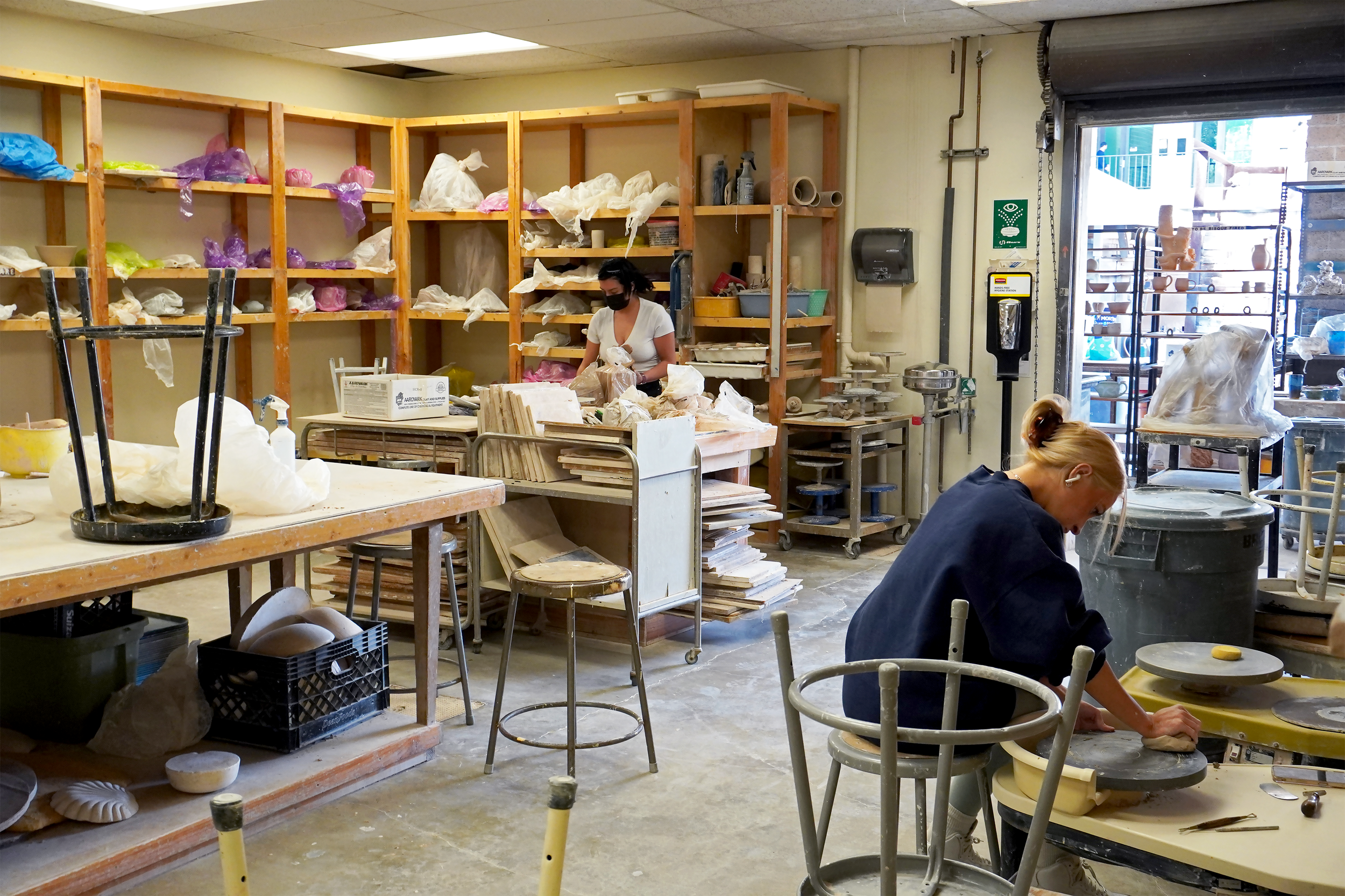Rumors regarding Moulton Hall investigation begin circulating due to lack of updates from university staff
While many classes at Moulton have been relocated due to the investigation, students enrolled in ceramics have been able to stay in their original classroom in order to access ceramics materials and supplies that they need. SIMRAH AHMAD, Staff Photographer
The ongoing investigation regarding Moulton Hall’s alleged health risks persists as environmental experts continue to examine the building, leaving students and faculty to remain in temporary classrooms for the remainder of the spring semester.
Students and faculty who had classes in Moulton Hall this semester were relocated in early April to new classrooms, including the Crean College of Health and Behavioral Sciences building, the Sandhu Residence and Conference Center and the Hashinger Science Center, for their safety. Currently, students and faculty continue to have their classes there while the investigation carries on.
While no new information has recently been made accessible to students and faculty regarding the investigation, Albert Vasquez, the vice president for Enterprise Risk and Safety and the primary point of contact for the investigation, stated in an interview with The Panther that a new update on where the investigation currently stands, should be announced to the Chapman community very soon.
“Earlier this month, I announced to our campus community and met with staff and faculty to discuss an environmental investigation of Moulton Hall because health concerns were brought to the attention of the Administration,” said Vasquez. “Currently, phase one of our investigation is nearly complete (after) having reviewed the parcel maps, prior uses of the land and associated documents. More updates on the situation (will be) made available shortly as we complete this phase.”
As students continue to wait for information on the situation from the university to little avail, rumors and theories regarding supposed health risks in the building have begun to circulate around the Moulton Hall community.
“I haven’t heard much about the investigation, but to be fair, I’m not sure the professors really know much either,” said senior graphic design major Sam Stein, who has three classes in Moulton Hall this semester. “Since the building is old, people have begun lightly joking about what could actually be happening in Moulton Hall, especially since the building has been checked for asbestos in the past.”
Jokes about Moulton Hall’s health risks range from speculations of asbestos to carbon monoxide issues. Since Moulton Hall is considered to be one of Chapman’s oldest buildings — built back in 1975 — and has apparently had problems with asbestos before according to a few Moulton Hall students, many believe that a similar problem could potentially be occurring now.
The Orange County based environmental experts, Geosyntec and Cardno ChemRisk, have been hired to further examine the building for any potential risks.
According to Vasquez, the investigation is currently finishing up its first phase, with a site walk having been scheduled for later in the month to further assess the building for risks. Air quality testing and site evaluation of Moulton Hall’s workspace as well as the building’s HVAC system will follow shortly after.
Since the investigation at Moulton is set to last between 90 to 120 days, according to Vasquez, students and faculty will have to remain in their relocated buildings for the rest of the semester.
Only a few of Moulton Hall’s painting and ceramics classes have been able to remain in the building in order for students to access the supplies in the studio needed to effectively complete the course.
“Since my ceramics class is considered to be an ‘open air’ space, I believe that it’s okay for us to remain in here, but at first, I did find it weird that we were able to stay here while many other classes were moved,” said senior business administration major Isabella Ierulli, who has a ceramics class in Moulton this semester. “I mostly just wish that the school could have been slightly more transparent about what was specifically going on so that we knew what we might have been exposed to.”
Ierulli, along with many other ceramics students, have remained in Moulton Hall’s ceramics classroom in order to utilize materials like kilns, shelves and pottery wheels. According to Ierulli, she hasn’t noticed anything in the building that would indicate specific health risks.
Moulton Hall students hope the university provides more updates soon regarding the investigation, before further rumors and theories are created and spread throughout the campus.
“I would prefer if the university did shed more light on the situation, because I personally hate being left in the dark — especially on issues like this that affect my and my peers’ learning,” said Emily Whitney, a senior graphic design major. “I’m not sure if I should be concerned with what’s going on, and I feel like all I have been hearing are conspiracy theories from different students in my classes.”
As the semester winds down with no updates about the potential risks, Moulton Hall will continue to be examined by both environmental firms and is scheduled to be completed in the summer.
Once more information is uncovered throughout the investigation, it will be made available to all students and faculty in a transparent manner, Vasquez said.

